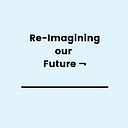Re-Imagining Personal Identities
“When you take off your mask, it’s easier for everyone else to do it. Our culture is so mask-driven. Imagine an office with no mask.” — Ram Dass
‘The cell membrane is not a wall or a skin or a sieve. It is an active and responsive part of the cell; it decides what is inside and what is outside and what the outside does to the inside. Cell membranes have ‘faces’ that enable cells to recognise and influence one another. The membranes are also communications systems. Things outside a cell do not necessarily act on the cell interior by passing through the membrane; they may simply change the membrane in some way that cause the membrane, in turn, to make changes in the cell interior.’ — Daniel Mazia: The Cell Cycle (1974)
Why do we build such rigid walls around our identities? Why does it hurt so much when people attack parts of our identities that we hold dear? Why do some people have more relative freedom to choose their identities, whereas others have their identity thrust onto them by the systems and structures that oppress them?
Our identities are beautiful things, each of us an entangled web of cultural histories, relationships and traces which have shaped us, and with each new interaction and encounter having the potential to shape us in new, unexpected ways.
So why do we build walls? Why do we pretend we’re not open systems, like cells, constantly communicating, relating with and changing each other? Witnessing identity politics, our in-group/out-group tendencies and polarising thinking dominate our relationships, either/or opposition seems to be the way we like to think about what’s different to us.
What would it look like if we tended to the membranes of our identities? What if we noticed when we come up against a boundary, something poking the edge of us — a sharp joke, perhaps, and instead of doubling down on the boundary-wall, we open ourselves up to the relationship, to changing ourselves through the encounter. What if, as Alex Ebert sings, our enemies become our teachers? What if we build the capacity to see the other in the self and the self in the other? If we see difference as a source of learning and growth and not a source of polarisation and othering. What if we were secure enough in our relationships to trust the other to change us?
Can you see yourself as wanting to change and be changed? The first time I left the USA and lived in a foreign country I was confronted with my identity, and my sense of who I thought I was. Holding onto this identity I struggled. It was like trying to fit a square peg into a circle hole. I slowly realized that I was not who I thought I was. This realization gave me permission to be someone different, to grow.
When I first came home friends and family expected me to be who I was before and at the beginning I met their expectations, and reverted to old ways of behaving. Since then I have left and come back many times, each time becoming more secure with my dynamic identity, and comfortable with my differences. This has given me a sense of permission not to conform to expectations that do not align with vision or values. I, as we all are, am a work in progress.
At Shikshantar I saw this quote on the wall: “5 minutes after your birth, they decide your name, nationality, religion and sect and you spend [the] rest of your life defending something you didn’t even choose.” It made me wonder, is there another way? Could there be a world where a child was able to choose their own religion? Could there be a world where there are no borders, and all actions are determined based on functionality? Could you imagine a culture council that met once a year to assess cultural norms and rituals, and decide which ones did not make sense? What mainstream norms or rituals would you want to change?
“Truth is a pathless land” — Jiddu Krishnamurti
Lead Author: Daniel Ford (first 5 paragraphs)
Daniel Ford is interested in how we use our differences to build stronger relationships, collaborate better and shape change in the world. He’s a strategist at Forum for the Future and a Deep Democracy practitioner. In 2021, he will be hosting an Enrol Yourself cohort, a peer-to-peer group embarking on an experimentation in collaboration, exploring how we can use our differences to respond to troubled times.
Anchor Author: Daniel Rudolph
Daniel Rudolph is interested in exploring alternative, experiential learning opportunities for people of all ages. He is passionate about forming community, and building public spaces for meaningful, transformational gathering. Currently he is spending a lot of his time learning juggling and facilitating gatherings. He also enjoys writing and sharing poetry. Daniel is a very curious and playful person and is always open for creative collaborations.
Dan will be facilitating a session in The MoveVent Project’s upcoming AHAM Festival. The festival starts today, you can learn more on the MoveVent page. Dan’s session will be on Tuesday 19:00–21:00 Indian Standard Time (IST).
